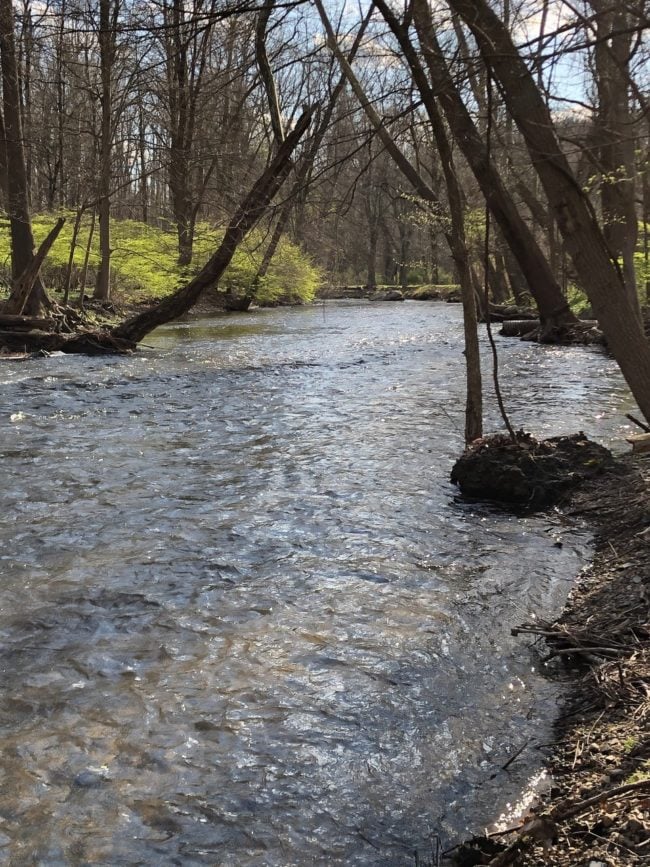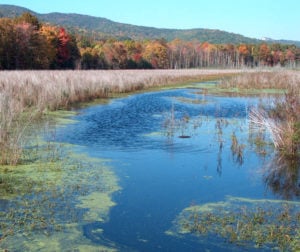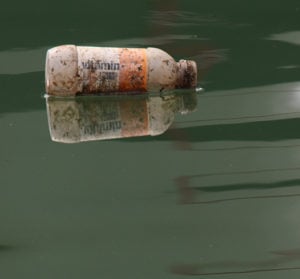Recapping NY’s legislative session: 6 wins, 7 to-do’s for the Hudson & the environment

View more images on our Flickr site
Lawmakers pass protections for streams and wetlands, and protect communities from cumulative effects of polluting facilities;
Action still needed on living shorelines, toxic pesticides and more. Sign up for updates on how you can act for a healthy Hudson River.
New York’s legislative session in Albany wrapped up for the year on June 4. Lawmakers passed many important bills and funding initiatives but also failed to tackle some important legislation that Riverkeeper and our partners are advocating. Below is a rundown of legislation Riverkeeper supported this session, how those bills ended up, and what is next.
6 wins
 1. Protection for 41,000 miles of streams passed the Legislature and now heads to Governor Kathy Hochul’s desk. Nearly 9,000 miles of streams in the Hudson River basin stand to gain protection if Governor Hochul signs the bill into law. In 2020, then Governor Cuomo vetoed the legislation, but with the help of Riverkeeper members, we can convince our new Governor to stand with us. This legislation is a top priority for Riverkeeper and we encourage you to contact the Governor via our action alert.
1. Protection for 41,000 miles of streams passed the Legislature and now heads to Governor Kathy Hochul’s desk. Nearly 9,000 miles of streams in the Hudson River basin stand to gain protection if Governor Hochul signs the bill into law. In 2020, then Governor Cuomo vetoed the legislation, but with the help of Riverkeeper members, we can convince our new Governor to stand with us. This legislation is a top priority for Riverkeeper and we encourage you to contact the Governor via our action alert.
2. Protecting communities from the cumulative effects of new polluting facilities in their neighborhoods is the aim of another bill passed by the Legislature and now awaiting action by Governor Hochul. The effort is being led by our partners WE ACT for Environmental Justice and South Bronx Unite. The Cumulative Impacts Bill amends the state environmental review law to take a more holistic look at environmental and health stressors pre-existing in a community when a new facility is proposed.
 3. Freshwater wetlands will receive long awaited new protections thanks to the Governor and Legislature, including policies in the final budget agreement in April. The new protections may result in an additional 1 – 1.5 million acres of freshwater wetlands falling under the jurisdiction of New York State Department of Environmental Conservation oversight. Riverkeeper members sent thousands of messages to their elected officials over the past decade in support of expanding protections for these precious natural areas – critical for climate resiliency, habitat and drinking water quality.
3. Freshwater wetlands will receive long awaited new protections thanks to the Governor and Legislature, including policies in the final budget agreement in April. The new protections may result in an additional 1 – 1.5 million acres of freshwater wetlands falling under the jurisdiction of New York State Department of Environmental Conservation oversight. Riverkeeper members sent thousands of messages to their elected officials over the past decade in support of expanding protections for these precious natural areas – critical for climate resiliency, habitat and drinking water quality.
4. The $4.2 Billion Clean Water, Clean Air and Green Jobs Bond Act was approved by the Legislature and Governor to appear on the November 8 general election ballot. With billions of dollars in funding available for water quality improvements, habitat restoration and climate resilience on the ballot in November, we are urging voters to vote “yes.” New York’s last environmentally focused bond act was approved in 1996 for $1 billion and helped usher in an era of environmental improvements such as wastewater infrastructure, drinking water treatment, hazardous waste cleanups and state park investments. Join us in supporting a transformative investment in a cleaner Hudson River and greener New York.
5. DEC’s Hudson River Estuary Program received a $1 million budget increase (15 percent) to a record $7.5 million for the next state fiscal year. In 2021, the program supported projects at 165 locations, with over 39 Estuary Grants (77 percent in environmental justice communities), and 24 curriculum modules for watershed education in the classroom. In total, this funding helped bring in more than $10 million in grants and funds from other sources. 43 percent of the Estuary Program’s environmental education takes place in environmental justice communities. The Estuary Program is at the front lines of preparing the Hudson River Estuary communities for the impacts of climate change.
6. A two year moratorium & study on cryptocurrency mining repowering retired fossil fuel plants, championed by our fellow Waterkeeper partner Seneca Lake Guardian, passed the Senate in the 11th hour after passing the Assembly. Crypto-mining poses a threat to New York’s climate goals and water quality, as retired power plants often rely on old water cooling intakes that can harm aquatic life. Governor Hochul has not indicated if she will sign the legislation, and her comments in a recent Governor’s debate raise more questions as she intends to punt on a decision until the end of the year. An Albany Times Union Editorial published recently calls on Governor Hochul to sign the moratorium immediately.
7 “to-do’s”
1. The Living Shorelines Act passed the state Senate 63-0 but did not come up for a vote in the Assembly. The legislation ensures that nature-based design features such as oyster reefs and wetlands are prioritized in shoreline development as the first alternative, as opposed to hardening measures such as rip-rap or sea walls. Living shorelines provide habitat for wildlife while providing natural defenses against climate change impacts such as sea-level rise and storm surges.
2. The Birds and Bees Protection Act passed the Assembly but failed to reach a vote in the Senate. The legislation targets an egregious use of toxic neonicotinoid pesticides applied to pretreated soy, corn, and wheat seeds. These pesticides leach off farm fields into waterways, endangering a wide variety of wildlife. Studies have shown that pretreatment is unnecessary, has limited impact on crop yields, and has a disastrous effect on not only pollinators such as native bees but also aquatic insects that fish and other species depend on.
3. Enhanced Public Participation for Environmental Reviews would help protect disadvantaged communities by requiring a more robust public participation process to ensure communities can receive information about potential impacts of projects to help facilitate community comments on environmental reviews. This legislation unfortunately did not pass either house of the Legislature.
4. The Water Bill Fairness Act confirms the existing powers of water boards to utilize water fee restructuring as a potential tool to fund, incentivize and implement projects to reduce stormwater runoff and potentially provide ratepayers with a more equitable rate structure.
5. The All-Electric Buildings Act would ensure that New York is set on a path to meet the ambitious goals of the Climate Leadership and Community Protection Act by requiring new construction eliminate the use of planet-warming fracked gas heating and cooking. The legislation faced stiff opposition from the fossil fuel industry and its allies. Governor Hochul and the State Senate supported the legislation but the Assembly failed to support the measure.
 6. The Bigger Better Bottle Bill will reduce plastic bottle litter in our waterways by raising New York’s bottle redemption rate to 10 cents per bottle (up from 5 cents), expand the bottles covered under the redemption law, and require manufacturers to increase the use of recycled plastic in their products. Plastic bottles are the single most common item found in our shoreline cleanups, and this is one practical step to address plastic pollution and improve recycling rates.
6. The Bigger Better Bottle Bill will reduce plastic bottle litter in our waterways by raising New York’s bottle redemption rate to 10 cents per bottle (up from 5 cents), expand the bottles covered under the redemption law, and require manufacturers to increase the use of recycled plastic in their products. Plastic bottles are the single most common item found in our shoreline cleanups, and this is one practical step to address plastic pollution and improve recycling rates.
7. SEQRA Standing Reform removes the “special harm” standing requirement imposed by the New York Court of Appeals requiring plaintiffs filing an action under the State Environmental Quality Review Act (SEQRA) to allege a potential injury greater than that to the public at large. The bill advanced to the floor of the Assembly but failed to advance to a vote or move out of committee in the Senate due to opposition from some lawmakers.
Riverkeeper is hard at work to ensure Governor Hochul signs important legislation on her desk and to build support for key legislation to receive approval in the next legislative session. Your membership and advocacy is what makes all the difference. Sign up for email actions and updates to ensure you can help us fight for a healthy Hudson River.
